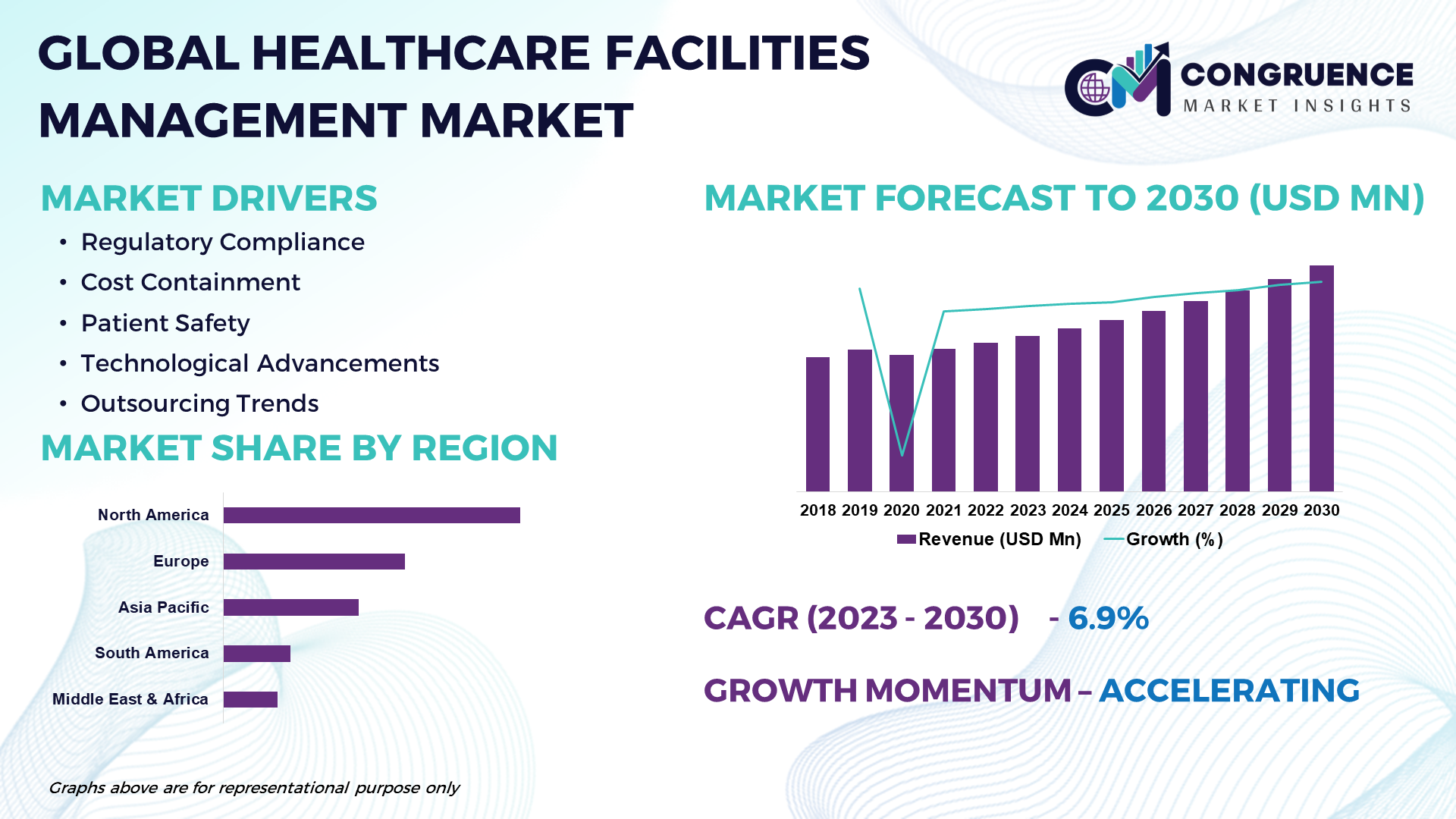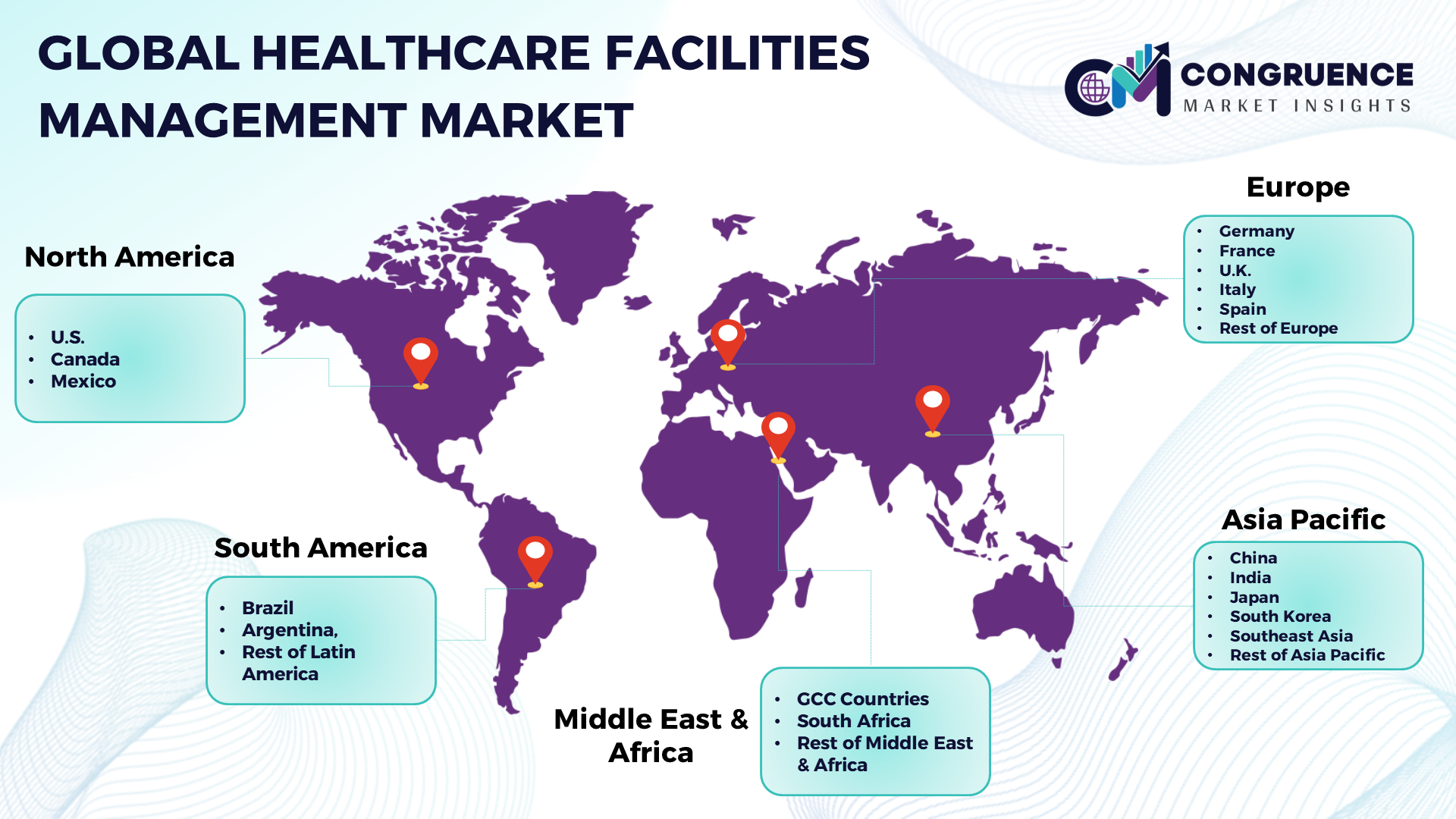Reports
The Global Healthcare Facilities Management Market is projected to expand at a moderate CAGR of 6.9% from 2023 to 2030, driven by factors such as the rising demand for outsourced facilities management services, the adoption of technology-enabled solutions, and the growing emphasis on cost containment and operational excellence in healthcare organizations. Healthcare facilities management involves the management and maintenance of healthcare infrastructure, equipment, and support services to ensure the smooth and efficient operation of healthcare facilities such as hospitals, clinics, nursing homes, and assisted living facilities. These services encompass a wide range of activities including building maintenance, engineering services, housekeeping, security, catering, laundry, waste management, and grounds maintenance. The Healthcare Facilities Management Market is experiencing steady growth driven by the increasing complexity of healthcare infrastructure, stringent regulatory requirements, and the growing focus on patient safety, infection control, and operational efficiency in healthcare facilities. Healthcare facilities management services play a crucial role in optimizing resource utilization, improving patient experience, and enhancing the overall quality of care delivery in healthcare settings.

Healthcare Facilities Management Market Major Driving Forces
Regulatory Compliance: The increasing regulatory requirements and accreditation standards for healthcare facilities regarding safety, sanitation, infection control, and environmental sustainability are driving the demand for healthcare facilities management services to ensure compliance and maintain accreditation.
Cost Containment: The rising healthcare costs, budget constraints, and the need for operational efficiency are driving healthcare organizations to outsource facilities management services to specialized providers to optimize costs, improve resource utilization, and focus on core clinical activities.
Patient Safety: The growing focus on patient safety, infection control, and environmental hygiene in healthcare facilities is driving the demand for healthcare facilities management services to implement best practices, standards, and protocols to mitigate risks, prevent healthcare-associated infections (HAIs), and ensure a safe care environment for patients and staff.
Technological Advancements: The adoption of technology-enabled facilities management solutions such as computerized maintenance management systems (CMMS), building automation systems (BAS), Internet of Things (IoT) devices, and predictive analytics is driving operational efficiency, proactive maintenance, and data-driven decision-making in healthcare facilities management.
Outsourcing Trends: The increasing trend of outsourcing non-core functions such as facilities management, support services, and maintenance activities to specialized service providers is driving the growth of the healthcare facilities management market, enabling healthcare organizations to access specialized expertise, reduce overhead costs, and focus on core clinical activities.
Healthcare Facilities Management Market Key Opportunities
Integrated Facilities Management: The adoption of integrated facilities management (IFM) solutions encompassing a comprehensive range of hard services, soft services, and support services presents opportunities for facilities management providers to offer bundled services, streamline operations, and provide value-added solutions to healthcare organizations.
Technology Integration: The integration of emerging technologies such as artificial intelligence (AI), machine learning (ML), robotics, and automation into facilities management solutions presents opportunities for service providers to enhance operational efficiency, optimize resource utilization, and deliver innovative services in healthcare facilities management.
Energy Management: The growing focus on energy efficiency, sustainability, and environmental stewardship in healthcare facilities presents opportunities for facilities management providers to offer energy management solutions, renewable energy integration, and green building initiatives to reduce energy consumption, lower operating costs, and achieve sustainability goals.
Healthcare Asset Management: The adoption of asset management solutions for healthcare infrastructure, medical equipment, and facility assets presents opportunities for facilities management providers to implement lifecycle management strategies, preventive maintenance programs, and technology-enabled asset tracking solutions to optimize asset utilization, reduce downtime, and ensure regulatory compliance.
Remote Monitoring and Telehealth: The adoption of remote monitoring technologies, telehealth platforms, and virtual care solutions in healthcare facilities presents opportunities for facilities management providers to support virtual care delivery, remote patient monitoring, and telemedicine initiatives through technology-enabled facilities management solutions, infrastructure support, and IT services.
Healthcare Facilities Management Market Key Trends
· Data-Driven Decision Making: The adoption of data analytics, predictive maintenance, and performance metrics in healthcare facilities management to enable data-driven decision-making, proactive maintenance, and continuous improvement in operational efficiency, asset utilization, and service quality.
· Smart Healthcare Facilities: The integration of smart building technologies, IoT sensors, and building automation systems (BAS) in healthcare facilities management to enable real-time monitoring, predictive maintenance, energy optimization, and automation of building systems and infrastructure.
· Healthcare Facility Design: The adoption of evidence-based design principles, patient-centered design approaches, and infection control measures in healthcare facility planning, construction, and renovation projects to optimize space utilization, improve workflow efficiency, and enhance patient experience in healthcare environments.
· Remote Facilities Management: The adoption of remote monitoring, remote diagnostics, and remote management solutions in healthcare facilities management to enable remote access, remote control, and remote support for critical infrastructure, equipment, and systems in distributed healthcare facilities.
· Resilience and Disaster Preparedness: The adoption of resilience planning, disaster preparedness, and business continuity strategies in healthcare facilities management to mitigate risks, ensure operational continuity, and enhance emergency response capabilities in the face of natural disasters, pandemics, and other emergencies.

Market Competition Landscape
The Global Healthcare Facilities Management Market is characterized by a diverse competitive landscape with a mix of global and regional players offering a wide range of facilities management services, solutions, and support services to healthcare organizations worldwide. Market players compete on factors such as service quality, expertise, scalability, pricing, and technological capabilities to differentiate themselves and gain a competitive edge in the market. Prominent players in the Healthcare Facilities Management Market include:
· Jones Lang LaSalle Incorporated
· CBRE Group, Inc.
· Sodexo
· Compass Group PLC
· ISS A/S
· Aramark Corporation
· Cushman & Wakefield PLC
· ABM Industries Incorporated
· Mitie Group PLC
· EMCOR Group, Inc.
These companies offer a comprehensive portfolio of facilities management services including hard services, soft services, support services, and integrated facilities management solutions tailored to the unique needs of healthcare organizations.
|
Report Attribute/Metric |
Details |
|
Base Year |
2022 |
|
Forecast Period |
2023 – 2030 |
|
Historical Data |
2018 to 2022 |
|
Forecast Unit |
Value (US$ Mn) |
|
Key Report Deliverable |
Revenue Forecast, Growth Trends, Market Dynamics, Segmental Overview, Regional and Country-wise Analysis, Competition Landscape |
|
Segments Covered |
· By Service Type (Hard Services, Soft Services, Support Services) · By Facility Type (Hospitals, Clinics & Outpatient Facilities, Assisted Living Facilities, Nursing Homes) · By End-user (Public Healthcare Institutions, Private Healthcare Institutions) |
|
Geographies Covered |
North America: U.S., Canada and Mexico Europe: Germany, France, U.K., Italy, Spain, and Rest of Europe Asia Pacific: China, India, Japan, South Korea, Southeast Asia, and Rest of Asia Pacific South America: Brazil, Argentina, and Rest of Latin America Middle East & Africa: GCC Countries, South Africa, and Rest of Middle East & Africa |
|
Key Players Analyzed |
Jones Lang LaSalle Incorporated, CBRE Group, Inc., Sodexo, Compass Group PLC, ISS A/S, Aramark Corporation, Cushman & Wakefield PLC, ABM Industries Incorporated, Mitie Group PLC, and EMCOR Group, Inc. |
|
Customization & Pricing |
Available on Request (10% Customization is Free) |
